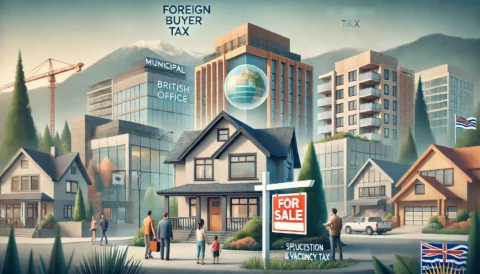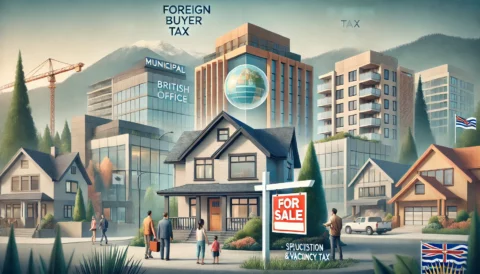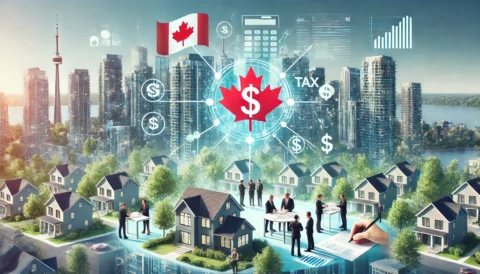Actual Property Taxes in BC, Canada and What You Ought to Know

Advertisement: Click here to learn how to Generate Art From Text

Actual Property Taxes in British Columbia, Canada
Navigating the complicated panorama of property taxes in British Columbia may be daunting. From property tax to overseas purchaser tax, hypothesis tax, and the underused housing tax, every has its personal implications for householders, consumers, and buyers. This text delves into these taxes, providing a complete understanding of their functions, charges, and impacts.
What’s Property Tax?
Property tax is a main income for municipalities in British Columbia, enjoying a important position in funding important providers that contribute to the well-being and growth of communities. These providers embody public security, comparable to police and fireplace safety; infrastructure upkeep and growth, comparable to roads, bridges, and public transportation techniques; and varied neighborhood packages, together with parks, leisure amenities, libraries, and social providers.
How is Property Tax Calculated
The tax is calculated based mostly on the assessed worth of the property, which is decided yearly by BC Evaluation, an impartial, provincial Crown company chargeable for property evaluation within the province. BC Evaluation evaluates properties to ascertain their market worth as of July 1st of every 12 months, contemplating components like location, dimension, age, situation, and up to date sale costs of comparable properties.
What’s the International Purchaser Tax?
The International Purchaser Tax, formally generally known as the Extra Property Switch Tax, was launched by the Authorities of British Columbia as a measure to chill the overheated housing market and enhance affordability for residents. This tax particularly targets overseas nationals, overseas firms, and taxable trustees who buy residential property in designated areas of BC. By imposing this tax, the federal government goals to scale back shopping for by non-residents, which has been contributing to hovering property costs and housing shortage for native residents.
For extra info go to the International Patrons Tax web page.
How is International Patrons Tax Calculated?
Calculating the Tax
The Extra Property Switch Tax is calculated based mostly on the property’s truthful market worth on the date of buy. For instance, if a overseas purchaser purchases a residential property valued at CAD 1,000,000, they’d be required to pay an extra CAD 200,000 because the International Patrons Tax. This quantity is along with the usual property switch tax.
When is International Purchaser Tax Paid?
Fee Course of
The International Patrons Tax should be paid on the time the property switch is registered with the Land Title Workplace. Failure to pay the tax can lead to important penalties and curiosity costs. It’s advisable for overseas consumers to work with an actual property, lawyer or notary to make sure all tax obligations are met and to facilitate the cost course of.
Find out how to Qualify for International Purchaser Tax Exemption
To qualify for exemptions, worldwide college students should exhibit that they’re actively pursuing research at an accredited establishment and have lived within the province for a specified interval. Equally, short-term employees should present steady employment in BC and residency within the province. These standards make sure that exemptions are granted to those that have a real connection to the neighborhood and aren’t merely investing in property for speculative functions.
What’s the Hypothesis and Emptiness Tax?
The SVT goals to discourage housing hypothesis and guarantee properties are used as main residences or rented out. It targets properties in main city centres left vacant for prolonged durations.
The Hypothesis and Emptiness Tax (SVT) is a singular measure launched by the British Columbia authorities to sort out housing affordability and make sure that properties in city areas are used successfully.
The tax applies to residential properties in particular taxable areas, together with Metro Vancouver, the Capital Regional District, Kelowna, and several other different city areas. Property house owners in these areas should full an annual declaration to substantiate how their property is used. The SVT primarily targets properties that aren’t getting used as a principal residence or rented out for a minimum of six months of the 12 months.
When is the Hypothesis and Emptiness Tax paid?
Fee Schedule:
- Frequency: The SVT is assessed and paid yearly.
- Due Date: Property house owners should full an annual declaration to find out if the tax applies to their property. The declaration is often due by March thirty first of every 12 months.
- Fee Deadline: If the tax applies, cost is often due by July 2nd of the identical 12 months.
How is the SVT calculated?
The SVT is calculated yearly based mostly on the property’s assessed worth. For Canadian residents or everlasting residents who aren’t BC residents, the speed is 0.5%. For overseas house owners and satellite tv for pc households, the speed is 2%.
Who must pay the SVT?
Property house owners in specified areas of BC, comparable to Metro Vancouver and the Capital Regional District, who both depart their properties vacant or don’t meet sure residency or utilization necessities, have to pay the SVT.
Underused Housing Tax (UHT)
What’s the Underused Housing Tax?
The UHT is a federal tax concentrating on underused or vacant residential properties owned by non-residents or non-Canadians. It goals to extend housing availability and affordability.
How can I Apply for Underused Housing Tax Exemption?
Exemptions and Submitting Necessities
There are a number of exemptions accessible beneath the UHT. Properties used as main residences, these rented out on a long-term foundation, and sure varieties of uninhabitable properties could also be exempt from the tax. International house owners should file an annual return to declare whether or not they owe the tax or qualify for an exemption. Failure to file this return can lead to important penalties, even when the property is exempt from the tax itself. Residence consumers ought to guarantee they perceive these necessities and search skilled recommendation if wanted to adjust to the rules.
Who’s topic to the UHT?
The UHT primarily applies to non-resident, non-Canadian property house owners who personal residential properties in Canada.
What’s the tax charge for the UHT?
The tax charge for the UHT is 1% of the property’s assessed worth.
How usually is the UHT assessed?
The UHT is assessed yearly.
Do property house owners have to file any paperwork for the UHT?
Sure, overseas property house owners should file an annual return to declare whether or not they owe the tax or qualify for an exemption. Failure to file this return can lead to important penalties.
How does the UHT differ from the Hypothesis and Emptiness Tax (SVT)?
The UHT is a federal tax relevant throughout Canada, concentrating on overseas house owners, whereas the SVT is a provincial tax in BC, concentrating on each residents and non-residents who depart properties vacant. The SVT charges range and may be larger than the UHT.
What ought to residence consumers in BC take into account concerning the UHT?
Residence consumers ought to take into account the annual 1% tax on the property’s assessed worth and guarantee they meet the submitting necessities to keep away from penalties. It is very important issue this tax into their general monetary planning and search skilled recommendation if wanted
BC Property Switch Tax (PPT)
In British Columbia, the Property Switch Tax (PPT) is a big consideration for homebuyers. This tax is levied at any time when a person purchases or features an curiosity in property throughout the province. Notably, the First-Time Residence Patrons’ Exemption supplies some reduction for eligible consumers by exempting them from paying the PPT on properties as much as a sure worth. Not too long ago, the exemption restrict has been elevated from $425,000 to $475,000, providing extra substantial monetary reduction for first-time consumers. This adjustment goals to ease the monetary burden on new householders, making the dream of proudly owning a house extra accessible in in the present day’s aggressive actual property market.
Qualifying for the BC PTT Exemption
To qualify for a full exemption, on the time the property is registered you could:
- be a Canadian citizen or everlasting resident
- have lived in B.C. for 12 consecutive months instantly earlier than the date you register the property or filed a minimum of 2 revenue tax returns as a B.C. resident within the final 6 years
- have by no means owned an curiosity in a principal residence wherever on this planet at any time
- you’ve got by no means acquired a primary time residence consumers’ exemption or refund
and the property should:
- be situated in B.C.
- solely be used as your principal residence
- have a truthful market worth of $475,000
- be 0.5 hectares (1.24 acres) or smaller
You could qualify for a partial exemption from the tax if the property:
- has a truthful market worth of lower than $500,000
- is bigger than 0.5 hectares
- has one other constructing on the property aside from the principal residence
Seeking to Calculate a PTT Exemption?
Take a look at this nice BC Property Switch Tax Exemption Calculator! For extra info go to BC Property Switch Tax web page.
BC Items and Companies Tax GST
What’s the Items and Companies Tax GST on Actual Property in BC?
The BC GST for a property is a 5% Federal tax that’s payable on the sale of name new properties and presales in British Columbia.
Once we check with new properties we imply newly constructed properties offered by a developer or an proprietor builder to a primary purchaser.
This additionally signifies that presale condos which might be each purchased from the developer or from the preliminary presale purchaser as an task of contract are topic to BC GST.
BC GST is often not payable on current properties that aren’t model new from the developer or builder.
Items and Companies Tax for Properties & BC Property Switch Tax Calculator
In referendum in 2011 British Columbia voters rejected the Harmonized Gross sales Tax by a margin of 55% in favour of retaining the Items and Companies Tax in BC.
There’s a large quantity of confusion surrounding taxes on property gross sales right here in BC.
I get so many questions on this subject that I’ve added this BC GST Rebate and PTT Calculator to my web site to attempt to dispel a number of the confusion surrounding taxes and actual property in British Columbia.
For extra info go to the GST Tax and Calculator web page.
Empty Properties Tax
The first goal of the Empty Properties Tax is to deal with the housing disaster in high-demand city areas like Vancouver. By imposing a tax on vacant residential properties, the federal government goals to encourage property house owners to make their properties accessible for hire or sale, thereby rising the general provide of housing. This tax is a part of broader efforts to enhance housing affordability and availability, guaranteeing that residential properties are used effectively to fulfill the wants of the inhabitants.
What’s the Empty Properties Tax?
The Empty Properties Tax, also called the Emptiness Tax, is a municipal tax imposed in sure areas of British Columbia, most notably within the metropolis of Vancouver. This tax goals to deal with the difficulty of housing availability by incentivizing property house owners to both occupy or hire out their residential properties, moderately than leaving them vacant.
How usually do I’ve to pat the Empty Properties Tax?
Fee Schedule
Property house owners in areas the place the Empty Properties Tax applies are required to pay this tax yearly. The tax is due on the finish of every calendar 12 months, with property house owners needing to declare the standing of their property by a specified date, usually in early February of the next 12 months. For instance, declarations for the 2023 tax 12 months could be due by early February 2024.
Frequency of Fee
The Empty Properties Tax is paid annually. Property house owners should submit a declaration every year to substantiate whether or not their property was occupied or rented out sufficiently to keep away from the tax. If a property is deemed vacant, the proprietor shall be billed for the tax on an annual foundation.
Flipping Tax
The flipping tax is imposed by the British Columbia authorities to discourage speculative actual property actions that contribute to housing market instability and decreased affordability. This tax targets householders and actual property buyers who purchase and promote properties inside a brief interval, usually inside 12 months of buy. By imposing this tax, the federal government goals to discourage fast property turnover, which may drive up housing costs and restrict the provision of properties for long-term residents. The flipping tax is calculated as a share of the property’s assessed worth on the time of sale and is payable along with any relevant capital features taxes. Sure exemptions apply, comparable to gross sales resulting from unexpected circumstances like loss of life, divorce, or employment relocation.
When do I’ve to pay for the Flipping Tax?
The flipping tax should be paid when the property is offered inside 12 months of acquisition. This brief holding interval triggers the tax, and the vendor is chargeable for paying it on the time of the property sale.
Frequency of Fee
The flipping tax is a one-time cost made every time a property is offered throughout the specified 12-month interval. If a vendor engages in a number of transactions inside this brief timeframe for various properties, the tax would apply to every sale individually.
FAQ: Actual Property Taxes in British Columbia
Common Property Tax
Q: What’s property tax?
A: Property tax is a main income for municipalities in British Columbia, funding important providers comparable to public security, infrastructure, and neighborhood packages. It’s calculated based mostly on the assessed worth of the property.
Q: How is property tax calculated?
A: Property tax is calculated by multiplying the assessed worth of the property by the municipal tax charge. Extra costs could apply for regional providers, college taxes, and different levies.
Q: How usually is the property assessed?
A: Properties are assessed yearly by BC Evaluation.
International Purchaser Tax
Q: What’s the International Purchaser Tax?
A: The International Purchaser Tax is a tax imposed on overseas nationals, overseas firms, and taxable trustees buying residential property in sure areas of BC to chill the housing market and make properties extra inexpensive for residents.
Q: What’s the charge of the International Purchaser Tax?
A: The International Purchaser Tax is 20% of the property’s truthful market worth.
Q: Which areas are topic to the International Purchaser Tax?
A: The tax applies to properties in Metro Vancouver, the Fraser Valley, the Capital Regional District, Nanaimo Regional District, and Central Okanagan.
Q: Are there any exemptions to the International Purchaser Tax?
A: Sure, exemptions could apply to worldwide college students and short-term employees assembly particular standards.
Hypothesis and Emptiness Tax (SVT)
Q: What’s the Hypothesis and Emptiness Tax (SVT)?
A: The SVT is designed to discourage housing hypothesis and guarantee properties are used as main residences or rented out. It targets properties in main city facilities which might be left vacant for prolonged durations.
Q: What are the charges for the SVT?
A: The SVT charges are 2% for overseas house owners and satellite tv for pc households and 0.5% for Canadian residents and everlasting residents who aren’t a part of a satellite tv for pc household.
Q: Are there exemptions to the SVT?
A: Sure, exemptions embody principal residences, tenanted properties, and sure particular instances like medical or incapacity causes.
Underused Housing Tax (UHT)
Q: What’s the Underused Housing Tax (UHT)?
A: The UHT is a federal tax geared toward underused or vacant residential properties owned by non-residents or non-Canadians to extend housing availability and affordability.
Q: What’s the charge of the UHT?
A: The UHT charge is 1% of the property’s worth.
Q: Who’s topic to the UHT?
A: Non-residents and non-Canadians proudly owning underused or vacant residential properties in Canada are topic to the UHT.
Q: Are there exemptions to the UHT?
A: Sure, exemptions embody properties used as main residences, rented for a good portion of the 12 months, or assembly different specified standards.
Items and Companies (GST) Tax
Q: What’s the BC GST Tax Rebate Calculator?
A: The BC GST Tax Rebate Calculator is a instrument designed to assist homebuyers estimate the quantity of Items and Companies Tax (GST) rebate they will obtain when buying new actual property in British Columbia.
Q: How does the GST rebate work for brand spanking new properties in BC?
A: In BC, homebuyers of recent or considerably renovated properties could also be eligible for a partial GST rebate. The rebate is meant to scale back the monetary burden of the GST on new residence purchases, making homeownership extra inexpensive.
Q: What’s Property Switch Tax (PTT) in British Columbia?
A: Property Switch Tax is a tax that should be paid if you buy or achieve an curiosity in property in BC. The quantity of PTT is dependent upon the property’s truthful market worth on the time of buy.
Q: Can I exploit the calculator for properties in Vancouver?
A: Sure, the BC GST Tax Rebate Calculator can be utilized for properties in Vancouver and different areas inside British Columbia to estimate each GST rebates and Property Switch Tax.
Q: Who’s eligible for the GST rebate on new properties?
A: Eligibility for the GST rebate on new properties is mostly restricted to people buying a brand new or considerably renovated residence as their main residence. There are particular standards that should be met to qualify for the rebate.
Q: What info do I want to make use of the calculator?
A: To make use of the BC GST Tax Rebate Calculator, you will have particulars concerning the buy worth of the house, any relevant PTT, and different related monetary info associated to the property buy.
Q: How correct is the calculator?
A: The calculator supplies an estimate based mostly on the knowledge entered. For exact calculations and to grasp all of the nuances of GST rebates and PTT, it’s advisable to seek the advice of with an actual property skilled or tax advisor.
Q: Does the calculator embody each GST and PTT estimates?
A: Sure, the calculator is designed to offer estimates for each GST rebates and Property Switch Tax, giving homebuyers a complete view of their potential tax obligations and financial savings.
Q: Are there different tax rebates accessible for homebuyers in BC?
A: Along with the GST rebate, there could also be different tax incentives and rebates accessible to homebuyers in BC. It’s advisable to analysis and seek the advice of with knowledgeable to grasp all accessible choices.
Property Switch Tax
Q: What’s the Property Switch Tax (PTT) in British Columbia?
A: The Property Switch Tax (PTT) is a tax that homebuyers in British Columbia should pay once they buy or achieve an curiosity in a property. The quantity of PTT is predicated on the property’s truthful market worth on the time of buy.
Q: What’s the First-Time Residence Patrons’ Exemption?
A: The First-Time Residence Patrons’ Exemption is a program that enables qualifying first-time homebuyers to be exempt from paying the Property Switch Tax on properties as much as a sure worth, decreasing the monetary burden of shopping for a house.
Q: What’s the new exemption restrict for first-time homebuyers?
A: The exemption restrict for first-time homebuyers has been raised to $475,000 from the earlier restrict of $425,000. Which means qualifying consumers should not have to pay PTT on properties valued as much as $475,000.
Q: Who qualifies for the First-Time Residence Patrons’ Exemption?
A: To qualify for the exemption, the client should be a Canadian citizen or everlasting resident, should have lived in BC for a minimum of 12 consecutive months earlier than the acquisition, or have filed a minimum of two revenue tax returns as a BC resident within the final six years. Moreover, the client should not have beforehand owned a principal residence wherever on this planet.
Q: What occurs if the property worth is above the exemption restrict?
A: If the property worth is above the $475,000 restrict however under $500,000, the client should qualify for a partial exemption. For properties valued above $500,000, the total quantity of the PTT should be paid.
Q: How is the Property Switch Tax calculated?
A: The PTT is calculated as 1% on the primary $200,000 of the property’s truthful market worth, 2% on the portion between $200,000 and $2,000,000, and three% on the portion above $2,000,000. For properties above $3,000,000, an extra 2% is utilized.
Q: Can first-time homebuyers get every other monetary help?
A: Along with the PTT exemption, first-time homebuyers in BC might also be eligible for different packages and incentives, such because the First-Time Residence Patrons’ Tax Credit score and the Residence Patrons’ Plan (HBP), which permits using RRSP funds for a down cost.
Q: How do I apply for the First-Time Residence Patrons’ Exemption?
A: To use for the exemption, consumers should full the First Time Residence Patrons’ Property Switch Tax Return and supply it to their authorized skilled, who will file it with the Land Title Workplace on the time of property switch.
Q: The place can I discover extra details about the First-Time Residence Patrons’ Exemption and PTT?
A: Extra details about the First-Time Residence Patrons’ Exemption and the Property Switch Tax may be discovered on the official BC authorities web site or by consulting with an actual property skilled or authorized advisor.
Q: Does the exemption apply to new constructions or pre-owned properties?
A: The exemption applies to each new constructions and pre-owned properties, so long as the property meets the worth standards and the client meets the eligibility necessities.
Q: Can I nonetheless qualify for the exemption if I’m shopping for with a co-purchaser?
A: Sure, you possibly can nonetheless qualify for the exemption if shopping for with a co-purchaser, supplied all co-purchasers meet the eligibility necessities for the First-Time Residence Patrons’ Exemption.

‘ Credit score:
Unique content material by www.mikestewart.ca – “Actual Property Taxes in BC, Canada and What You Ought to Know”
Learn the total article at https://www.mikestewart.ca/real-estate-taxes-in-canada-and-what-you-should-know/





